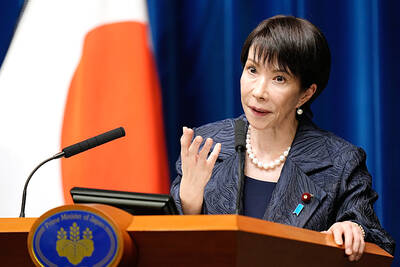The Central Epidemic Command Center on Monday said that it was mulling implementing rapid polymerase chain reaction (PCR) tests at COVID-19 hotspots nationwide to eliminate diagnosis delays.
The purpose would be to improve the efficiency of testing and reduce the waiting time for the results, the center said.
Since a domestic COVID-19 outbreak began last month, the government has been setting up numerous testing sites at hotspots, where people undergo not only a rapid antigen test, but also a PCR test, as the latter remains the standard for confirming COVID-19 cases.
Unlike PCR tests, which look for traces of SARS-CoV-2 genetic material in a patient’s mucus, rapid antigen tests are used to detect the protein of the virus.
Anyone who receives a positive result from a rapid antigen test is sent to either a hospital, government quarantine center or asked to quarantine at home while they wait for a PCR test result.
Those who receive a negative rapid antigen test result are asked to monitor their health while waiting for their PCR test result.
The center on Monday said that it was planning to use rapid PCR tests when people test positive in a rapid antigen test.
Centers for Disease Control Deputy Director-General Philip Lo (羅一鈞), deputy head of the center’s medical response division, said results of a rapid PCR test can be provided in about 20 minutes, significantly quicker that the three-and-a-half hours required by a standard PCR test.
Both methods involve using a nasal swab to collect mucus to determine whether SARS-CoV-2 is present. The only difference is the time it takes to provide a result, he said.
Rapid PCR tests were first used at Taoyuan General Hospital when Taiwan launched a “travel bubble” with Palau in April, he added.

The Ministry of Foreign Affairs (MOFA) yesterday voiced dissatisfaction with the Comprehensive and Progressive Agreement for Trans- Pacific Partnership (CPTPP), whose latest meeting, concluded earlier the same day, appeared not to address the country’s application. In a statement, MOFA said the CPTPP commission had "once again failed to fairly process Taiwan’s application," attributing the inaction to the bloc’s "succumbing to political pressure," without elaborating. Taiwan submitted its CPTPP application under the name "Separate Customs Territory of Taiwan, Penghu, Kinmen and Matsu" on Sept. 22, 2021 -- less than a week after China

THE GOOD WORD: More than 100 colleges on both sides of the Pacific will work together to bring students to Taiwan so they can learn Mandarin where it is spoken A total of 102 universities from Taiwan and the US are collaborating in a push to promote Taiwan as the first-choice place to learn Mandarin, with seven Mandarin learning centers stood up in the US to train and support teachers, the Foundation for International Cooperation in Higher Education of Taiwan (FICHET) said. At the annual convention of the American Council on the Teaching of Foreign Languages held over the weekend in New Orleans, Louisiana, a Taiwan Pavilion was jointly run by 17 representative teams from the FICHET, the Overseas Community Affairs Council, the Steering Committee for the Test of Proficiency-Huayu, the

A home-style restaurant opened by a Taiwanese woman in Quezon City in Metro Manila has been featured in the first-ever Michelin Guide honoring exceptional restaurants in the Philippines. The restaurant, Fong Wei Wu (豐味屋), was one of 74 eateries to receive a “Michelin Selected” honor in the guide, while one restaurant received two Michelin stars, eight received one star and 25 were awarded a “Bib Gourmand.” The guide, which was limited to restaurants in Metro Manila and Cebu, was published on Oct. 30. In an interview, Feng Wei Wu’s owner and chef, Linda, said that as a restaurateur in her 60s, receiving an

MORE RETALIATION: China would adopt a long-term pressure strategy to prevent other countries or future prime ministers following in Sanae Takaichi’s steps, an academic said Taiwan should maintain communications with Japan, as Japanese Prime Minister Sanae Takaichi is to lead a revision of security documents, Taiwanese academics said yesterday. Tensions have risen between Japan and China over remarks by Takaichi earlier this month that the use of force against Taiwan would constitute a “survival-threatening situation” for Japan. Prospect Foundation president Lai I-chung (賴怡忠) yesterday said Takaichi’s stance regarding Taiwan is the same as past Japanese prime ministers, but her position is clearer than that of her predecessors Fumio Kishida and Shigeru Ishiba. Although Japan views a “Taiwan contingency” as a “survival-threatening situation,” which would allow its military to